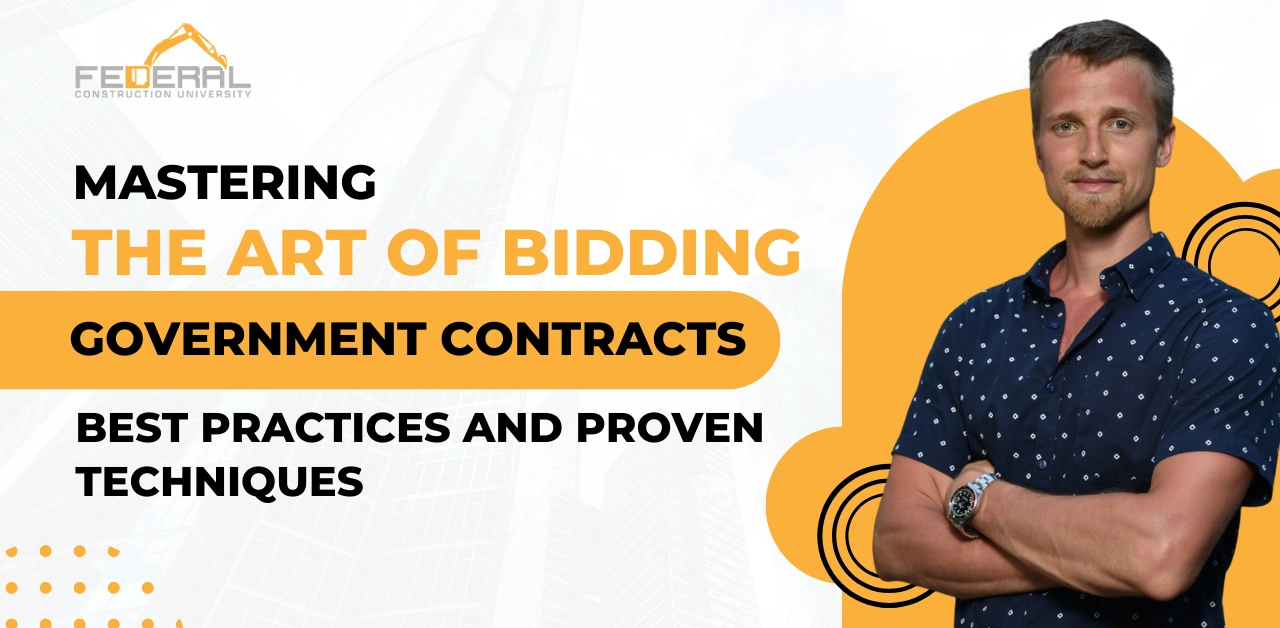Securing government contracts can be a game-changer for businesses, providing a steady revenue stream, long-term projects, and credibility in the marketplace.
However, bidding government contracts can be complex and competitive. In this comprehensive guide, we will explore the best practices and proven techniques that can help businesses master the art of bidding government contracts. From understanding the process to crafting winning proposals, this guide will provide valuable insights to maximize your chances of success.
Understanding the Government Contracting Landscape:
Before diving into the bidding process, it’s essential to have a clear understanding of the government contracting landscape. Familiarize yourself with the types of government agencies, their procurement methods, and the specific regulations governing their contracts. This knowledge will help you navigate the system’s complexities and tailor your approach accordingly.
Researching and Identifying Opportunities:
Explore government procurement websites, government bidding website, industry databases, and networking platforms to identify relevant opportunities. Focus on contracts that align with your business capabilities and expertise. Evaluate the agency’s needs, project scope, and contract requirements to ensure a good fit.
Preparing for the Bidding Process:
Preparing for the bidding process requires careful planning and attention to detail. Determine the resources and team members necessary for the bid government contracts, establish timelines, and assign responsibilities. Thoroughly review the solicitation documents, paying close attention to evaluation criteria, submission requirements, and contractual terms.
Crafting a Winning Proposal:
A well-crafted proposal is crucial to standing out among competitors and securing government contracts.
- a. Understanding the Agency’s Needs: Clearly articulate how your solution aligns with their objectives and provides value.
- b. Demonstrating Expertise and Experience: Highlight your company’s qualifications, relevant experience, and past performance in similar projects. Provide concrete examples of successful outcomes, emphasizing how your expertise sets you apart from competitors.
- c. Delivering a Clear and Compelling Message: Structure your proposal logically and organized, making it easy for evaluators to navigate.
- d. Addressing Evaluation Criteria: Carefully address each evaluation criterion specified in the solicitation. Provide comprehensive responses that demonstrate how your company meets or exceeds the requirements.
- e. Collaborative Approach: If applicable, emphasize your willingness to collaborate with the government agency and stakeholders. Showcase your ability to work as a partner, offering innovative ideas and solutions.
- f. Pricing Strategy: Develop a competitive and realistic pricing strategy. Consider direct costs, indirect costs, profit margins, and long-term value.
Building Relationships and Networking
Building relationships and networking within the government contracting community can significantly enhance your chances of success. Attend industry conferences, trade shows, and government procurement events to connect with decision-makers and industry professionals.
Compliance and Legal Considerations
Compliance with legal and regulatory requirements is essential when bidding government contracts. Familiarize yourself with the applicable laws, such as the Federal Acquisition Regulation (FAR), and ensure your business is fully compliant. Pay attention to specific requirements, such as small business set-asides or socioeconomic certifications, and provide you meet the eligibility criteria.
- Teaming and Subcontracting Opportunities: Teaming up with other companies or subcontracting can be advantageous when bidding government contracts. Identify potential teaming partners or subcontractors who bring complementary skills, resource, or government contracting certification to enhance your bid. Establish clear roles and responsibilities, and ensure a mutually beneficial agreement that aligns with the contract requirements.
- Competitive Pricing Strategies: Conduct a thorough analysis of direct and indirect costs, taking into account labor, materials, overhead, and profit margins. Consider the long-term value and the potential for contract extensions when determining your pricing structure.
- Effective Proposal Management: Efficiently managing the proposal development process is critical to submitting a strong bid. Assign a dedicated proposal manager or team to oversee the process. Establish a clear timeline, define responsibilities, and adhere to deadlines. Ensure team members communicate effectively and maintain version control to avoid confusion or errors. Conduct regular reviews and evaluations to improve the quality of your proposals continuously.
- Continuous Learning and Improvement: Learning from each bidding experience is essential for continuous improvement. Whether you win or lose a contract, seek feedback from the government agency to understand areas for improvement. Analyze your strengths and weaknesses, identify lessons learned, and refine your bidding strategies accordingly.
- Post-Bid Follow-Up and Engagement: After submitting your bid, it’s important to maintain engagement with the government agency.
- Debriefing and Learning Opportunities: Whether you win or lose bidding government contracts, take advantage of the debriefing process offered by the agency. Debriefings provide valuable insights into the strengths and weaknesses of your proposal, allowing you to learn from the experience and improve future bids. Request specific feedback on areas where your proposal could have been more robust or where it excelled. Use this information to refine your strategies, enhance your capabilities, and address any identified gaps.
- Diversifying Your Portfolio: To increase your competitiveness in government contracting, consider diversifying your portfolio. This could involve developing new capabilities, obtaining additional certifications, or entering into strategic partnerships to broaden your expertise and attract a broader range of contract opportunities.
- Building a Reputation and Past Performance: Establishing a solid reputation and demonstrating a track record of successful performance in government contracts can significantly enhance your chances of winning future bids. Focus on delivering exceptional results on awarded contracts, meeting project milestones, and exceeding client expectations. Seek opportunities to showcase your achievements through case studies, testimonials, and references. A strong reputation for reliability and quality work can make you a trusted partner in the eyes of government agencies.
- Leveraging Technology and Innovation: Embrace technology and innovation to gain a competitive edge in bidding government contracts. Stay updated on emerging technologies that are relevant to your industry and explore how they can enhance your solutions and service offerings. Leverage digital tools for streamlined proposal development, collaboration, and project management. Technology can also help you stay informed about contract opportunities, track market trends, and efficiently manage compliance requirements.
- Navigating Set-Asides and Socioeconomic Programs: Government agencies often allocate a portion of contracts to specific socioeconomic categories, such as small businesses, minority-owned businesses, or veteran-owned businesses. Understand the set-aside programs applicable to your company and leverage them. Obtain the necessary certifications and registrations to qualify for these programs, as they can provide increased visibility and access to exclusive contracting opportunities.
- Ethical Considerations and Integrity: Maintain the highest standards of ethics and integrity throughout the bidding process and contract execution. Ensure transparency and honesty in your interactions with government agencies, subcontractors, and teaming partners.
- Collaborating with Industry Associations and Consultants: Joining industry associations and leveraging consultants’ expertise can provide valuable resources and support in bidding government contracts. Industry associations offer networking opportunities, training programs, and access to industry-specific information. Consultants with experience in government contracting can guide and assist in navigating the complex bidding process, increasing your chances of success.
Mastering the art of bidding government contracts requires a comprehensive approach encompassing research, preparation, relationship-building, compliance, strategic pricing, effective proposal management, and continuous improvement. By following best practices and proven techniques, businesses can increase their competitiveness and maximize their chances of winning government contracts. Remember, success in government contracting is not achieved overnight but through persistence, continuous learning, and a commitment to excellence. Embrace the opportunities that government contracts offer.
Conclusion
Bidding government contracts can be a challenging but rewarding endeavor for businesses. Thorough research, careful preparation, crafting compelling proposals, building relationships, compliance with regulations, strategic pricing, effective proposal management, and continuous learning are vital elements to consider.
If you want to embrace your bidding government contracts opportunities and position your business for growth, sustainability, and long-term success in the public sector, you must check the Justin Ledford Federal Construction University. Visit the Justin Ledford FCU with dedication, perseverance, and a commitment to excellence, your company can unlock the potential of government contracts and secure valuable projects that drive your business forward.











